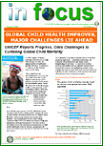|
A GLOBAL CODE OF CONDUCT FOR U.S. TOBACCO COMPANIES
What would the Code of Conduct for Tobacco Companies Do? It would require U.S. tobacco companies to print health warning labels on tobacco products sold overseas that are as stringent as those required in the United States, and it would prohibit U.S. tobacco companies from advertising or marketing tobacco products to children in other countries, with the same promotional standards applied to their overseas conduct as at home. The Code of Conduct simply says: No double standards. Children outside the United States deserve the same protections as those in the country. How would the Code of Conduct Work? The Code of Conduct is modeled on the Foreign Corrupt Practices Act, which prohibits the use of instrumentalities of U.S. interstate commerce by U.S. companies or their subsidiaries in furtherance of bribery of foreign officials. The Code would prohibit use of the instrumentalities of U.S. interstate commerce (mail, telephone, fax, e-mail, etc.) in connection with overseas tobacco labeling or marketing that did not comply with U.S. domestic standards. This prohibition would apply to tobacco companies, their subsidiaries and affiliates. Violations would be punished according to the penalty structure of the Food, Drug and Cosmetic Act, of which the Code would become a part. Would the Code of Conduct Unfairly Disadvantage U.S. Companies? The Code simply says that U.S. companies cannot market to children outside the United States. That prohibition will only disadvantage U.S. companies if they are marketing to children - a claim they vigorously deny. Would the Code of Conduct Violate GATT or Other U.S. Treaty Obligations? No. The Code applies only to U.S. companies, so it does not run afoul of GATT or similar agreements. How would the Code be Enforced? The Code would be enforced by the U.S. Justice Department in concert with the Food and Drug Administration. The Foreign Corrupt Practices Act has not imposed any discernible, excessive administrative burden on the Justice Department, and there is little reason to believe the Code would create more substantial difficulties. And while there have been few prosecutions under the FCPA, there is widespread agreement that it has meaningfully altered U.S. corporate behavior overseas. Would the Code Push U.S. Companies To Move Operations Offshore? No. The Code applies to all U.S. tobacco companies' overseas operations, whether cigarettes are exported from the United States or made overseas. Either way, the marketing or labeling of cigarettes in ways that do not at a minimum meet U.S. standards would be prohibited. Shifting production overseas would not enable companies to escape the Code's prohibitions. Would the Code Improperly Interfere with Other Nations' Sovereignty? The Code only applies to U.S. companies and it sets a public health-promoting floor on their operations. Very few countries are likely to complain about the United States imposing public health standards on its companies' international operations, especially when those companies are so aggressive in promoting the deadly tobacco habit. With the Code in place, other countries will remain free to demand tobacco companies adhere to more stringent regulations, as several already do. Wouldn't a Multilateral Approach be Better? Efforts to negotiate a World Health Organization International Framework Convention on Tobacco deserve strong support. But they are not a substitute for the Code of Conduct. While a Framework Convention – which has little prospect of rapid conclusion - would set out a model for how countries should regulate tobacco, countries would be free to disregard it. Among those countries that introduce strong tobacco control legislation, experience shows that many under-funded government agencies will not be able to enforce it in the face of Big Tobacco's political power and evasive tactics. And, in any case, holding U.S. companies to a minimum standard of conduct worldwide should convert them into advocates of similar standards to be applied to tobacco companies based in other nations.
---------
For more information, Contact: Essential Action Robert Weissman: Tel: 202-387-8030 |
|
|||||||||||
Questions? Comments? Concerns? E-mail CECHE at CECHE@comcast.net Go back to the CECHE home page Go back to the CECHE home page
|

